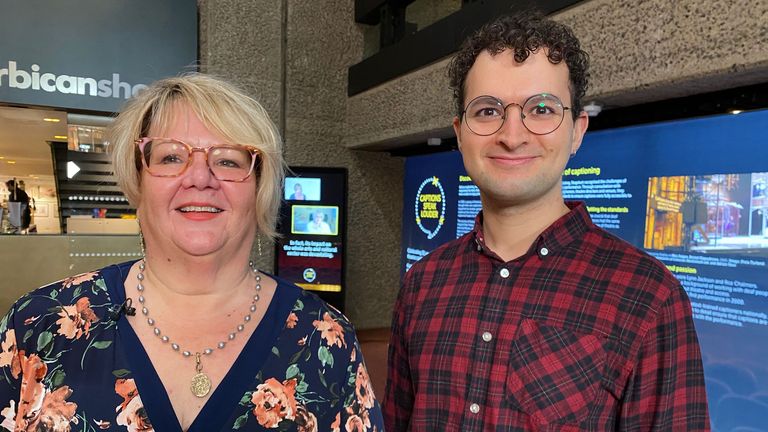‘We are breaking through barriers’: Calls to expand the use of subtitles in theatres and on television | Ents & Arts News
[ad_1]
There have been calls to expand the use of subtitles in theatres and on television as deaf performers “break through barriers” in the arts.
Millions tuned in to watch EastEnder’s actress Rose Ayling-Ellis on Strictly Come Dancing last Saturday, with her part-silent performance hailed by some as the greatest in the show’s history.
She is the first deaf contestant in the BBC show’s history.
“We are definitely breaking through barriers,” says Royal Shakespeare Company deaf actor William Grint – who performs while signing British Sign Language.
“To be watching Rose on Strictly and seeing how she’s impacting deaf people’s lives…oh wow!”
Grint too is a trailblazer for the deaf community as a member of the prestigious RSC.
He says signing the Bard is a challenge: “Particularly with Shakespearean plays and the translation process, trying to get old English to link back to British Sign language.
“It has been an amazing experience and process and it’s definitely breaking barriers for a lot of deaf actors around the country.”
Speaking in between performances of A Comedy of Errors at the Barbican, he said he hopes greater representation will “increase awareness”.
“I’ve known Rose all of my life,” he added.
“I just hope that the awareness is going to spread.”
Alongside his character acting at the RSC, Grint is also an understudy for one of the group’s hearing leads.
Films like Coda and Sound of Metal are introducing mainstream audiences to the reality of living with profound hearing loss.
There are close to 12 million deaf people in the UK who rely on subtitles or signing in theatres, cinemas, or on TV – but it’s not only deaf people who rely on captions.
New research by deaf-led charity Stagetext shows that 24% of the public now keep TV captions switched on all the time at home.
Many channels, including Sky News, are subtitled but some are better at it than others. In October, broadcasting watchdog Ofcom had to field complaints about Channel 4 for taking weeks to fix a technical issue that left viewers unable to watch big shows like Bake Off.
TV critic Scott Bryan said the delay has been disgraceful.
“I think for many viewers, it was quite a surprise because Channel four is seen to be an incredibly inclusive broadcaster,” he said.
“I was hearing from a lot of people who depend on subtitles for their broadcast experience, for watching TV, who said they just felt let down, excluded, or ignored. “
Captions are widely considered to be an essential part of a broadcaster’s remit, but in theatres often it’s not given the same consideration.
Melanie Sharpe, Chief Executive of StageText, said: “There’s a long way to go.
“[The charity] has been here for 21 years and there’s still a lot of work to be done because only about 1% of theatre performances that are captured throughout the UK.”
Oliver Webster, who is deaf and works as a Programme Systems Manager for StageText, added: “What that really means, in reality, there are only one or two shows in a run with captions that I can go to.
“If I’m busy, that’s it, I have no other options.”
[ad_2]
Source link













